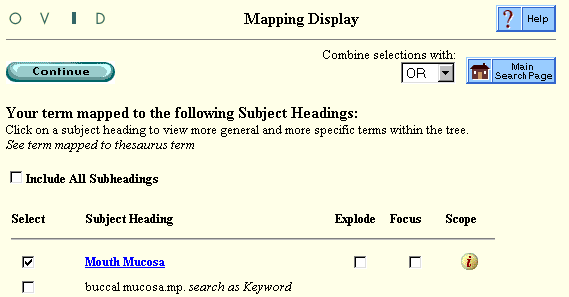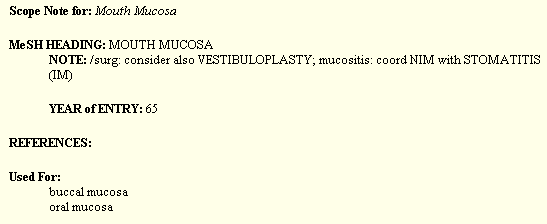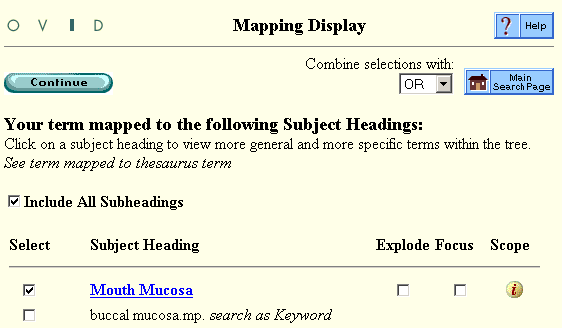
The search box looks like this:

Be sure to check the box "Map Term to Subject Heading". This will help you find the correct MeSH heading (official Medical Subject Heading) for your topic. If you don't check it, you will be doing a "Keyword search", which means you'll only find articles that happen to contain the exact word(s) you typed (in their title, abstract, etc.).
For many topics, you will find a lot more articles if you search by Subject Heading (and the articles will be more relevant, too).
To show this with an example, let's say we type the term "buccal musosa" without checking "Map Term to Subject Heading", then we click "Perform Search":

We get 1,853 results:

Now, that might sound like a lot, but remember this search covered the years all the way back to 1966.
Let's try the same search again, but this time we'll check "Map Term to Subject Heading":

Then we see this "Mapping" screen:

There's a lot of information on this screen, so we'll leave some of it for later in the tutorial. For now, the key fact is that Ovid is suggesting Mouth Mucosa as a Subject Heading for our topic. It is also offering us another option, to search "buccal mucosa" as Keyword.
If we select the Subject Heading Mouth Mucosa, we'll get all articles that an indexer has determined are about this subject. If we select "buccal mucosa search as Keyword", we'll get all articles that happen to have this term in the title, abstract, etc.
Ovid is also giving us a hint as to which option we should select: it has checked the box next to Mouth Mucosa in the "Select" column. This means Ovid is pretty "sure" this is the right Subject Heading for our topic.
We can find out more about the Subject Heading by clicking
![]() (for "information"):
(for "information"):

This tells us that the Subject Heading Mouth Mucosa is Used For "buccal mucosa" and "oral mucosa". This means these terms are considered synonyms (more or less) of mouth mucosa -- so articles about them are indexed under the official Subject Heading Mouth Mucosa.
(The "YEAR OF ENTRY" tells us this has been an official Medical Subject Heading since 1965.)
After reading this note, we can get back to the Mapping screen by clicking ![]() .
.
If we want all articles about Mouth Mucosa (as opposed to just a particular aspect of the
topic, such as Chemistry), we should check the box
![]() :
:

(Later on we'll talk about subheadings in detail.)
Normally, at this point we would have to decide whether to check EXPLODE or FOCUS, but for now let's not worry about those options, since they're dealt with later in the tutorial.
Finally, to perform the search for the Subject Heading Mouth Mucosa, we click:
![]()
We get over 15,000 results:

Compare the results:
Our results were also more relevant when we mapped to Subject Heading than when we searched by Keyword. For instance, our Keyword search retrieved the article "A case of fatal triazolam overdose", because the abstract begins:
A 57-year-old man was found dead lying down in a bamboo thicket. Moderate to severe petechiae were present on his conjunctivae, buccal mucosa, and laryngeal mucosa at autopsy...While this abstract includes the words "buccal mucosa", the article is not really about that, and if you were researching buccal mucosa, you probably wouldn't want to find this article among your results.
The indexer who analyzed this article did NOT give it the Subject Heading Mouth Mucosa. Instead, she gave it Subject Headings like Anti-Anxiety Agents / po [Poisoning] and Triazolam / po [Poisoning]. When we searched by Keyword, we found this not-so-relevant article. But when we mapped to Subject Heading, we avoided it.
Dental Library home page
All contents copyright Margaret Fulford © 2004. All rights reserved.